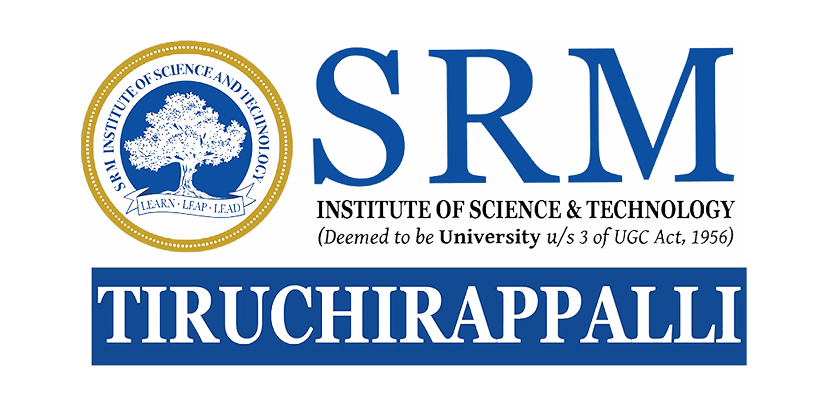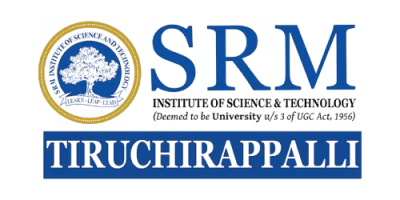B.Tech Electronics And Communication Engineering
The department of Electronics and Communication Engineering at SRMIST TRC stands in the forefront of technical and technological forte. The domain of Electronics and Communication Engineering is typically a combination of software and hardware with endless opportunities to explore. The laboratories with experimental setups as per and beyond the curriculum, faculty members from diversified research backgrounds and rich experience make the department so unique.
Electronic design, Communication Technologies, hands-on programming, research based training and enhancement of entrepreneurial skills are the flagship ideas with which the curriculum is devised, which in turn offers a top-notch learning experience to our students in the niche areas of Electronics and Communication Engineering.
Options are also available for the students to take up interdisciplinary courses along with their regular ones to enrich their knowledge in the other engineering domains which is further evolved as a multidisciplinary projects developed by the talent pool of the students.
Department Profile
The department of Electronics and Communication Engineering at SRMIST TRC stands in the forefront of technical and technological forte. The domain of Electronics and
Communication Engineering is typically a combination of software and hardware with
endless opportunities to explore. The laboratories with experimental setups as per and beyond the curriculum, faculty members from diversified research backgrounds and rich experience make the department so unique.
Electronic design, Communication Technologies, hands-on programming, research based training and enhancement of entrepreneurial skills are the flagship ideas with which the curriculum is devised, which in turn offers a top-notch learning experience to our students in the niche areas of Electronics and Communication Engineering.
Options are also available for the students to take up interdisciplinary courses along with their regular ones to enrich their knowledge in the other engineering domains which is further evolved as a multidisciplinary projects developed by the talent pool of the students.
The department has highly qualified faculty specialized in Communication Engineering, Image Processing, Microwave Engineering, Fibre Optics and Embedded Systems.
Department of Electronics and Computer Engineering
Vision & Mission
Vision
- Department of ECE is dedicated to create and disseminate knowledge in the area of Electronics and Communication Engineering through internationally accredited educational process.
- The Department will offer a unique learning experience to the students.
- The Department is determined to prepare them as highly ethical and competent professionals, who in turn will work for the betterment of mankind through technology innovation and management.
- Build an educational process that is well suited to local needs as well as satisfies the international accreditation requirements.
- Attract the right people and retain them by building an environment that foster work freedom and empowerment.
- With the right talent pool, create knowledge and disseminate, get involved in collaborative research with reputed universities and produce competent graduates
Program Objectives (PO)
1.Engineering knowledge: Apply the knowledge of mathematics, science, engineering fundamentals, and an engineering specialization to the solution of complex engineering problems.
2.Problem analysis: Identify, formulate, review research literature, and analyze complex engineering problems reaching substantiated conclusions using first principles of mathematics, natural sciences, and engineering sciences.
3.Design / development of solutions: Design solutions for complex engineering problems and design system components or processes that meet the specified needs with appropriate consideration for the public health and safety, and the cultural, societal, and environmental considerations.
4.Conduct investigations of complex problems: Use research-based knowledge and research methods including design of experiments, analysis and interpretation of data, and synthesis of the information to provide valid conclusions.
5.Modern tool usage: Create, select, and apply appropriate techniques, resources, and modern engineering and IT tools including prediction and modelling to complex engineering activities with an understanding of the limitations.
6.The engineer and society: Apply reasoning informed by the contextual knowledge to assess societal, health, safety, legal and cultural issues, and the consequent responsibilities relevant to the professional engineering practice.
7.Environment and sustainability: Understand the impact of the professional engineering solutions in societal and environmental contexts, and demonstrate the knowledge of, and need for sustainable development.
8.Ethics: Apply ethical principles and commit to professional ethics and responsibilities and norms of the engineering practice.
9.Individual and teamwork: Function effectively as an individual, and as a member or leader in diverse teams, and in multidisciplinary settings.
10.Communication: Communicate effectively on complex engineering activities with the engineering community and with society at large, such as, being able to comprehend and write effective reports and design documentation, make effective presentations, and give and receive clear instructions.
11.Project management and finance: Demonstrate knowledge and understanding of the engineering and management principles and apply these to one’s own work, as a member and leader in a team, to manage projects and in multidisciplinary environments.
12. Life-long learning: Recognize the need for and have the preparation and ability to engage in independent and life-long learning in the broadest context of technological change
Program Educational Objectives (PEO)
PEO – 1 Apply the acquired knowledge and skills in solving real-world engineering problems, considering national/global and societal issues such as health, environment, and safety.
PEO – 2 Create technologically innovative products that are economically viable and socially relevant.
PEO – 3Develop an attitude toward pursuing knowledge and advanced education for sustained career advancement to adapt to emerging fields.
PEO – 4 Demonstrate leadership qualities and effective communication skills to work in a team of enterprising people in a multidisciplinary and multicultural environment with strong adherence to professional ethics.
Program Specific Outcomes (PSO)
PSO – 1 Problem-Solving Skills: Should be able to associate the learning from the courses related to Microelectronics, Signal processing, Microcomputers, Embedded and Communication Systems to arrive at solutions to real world problems.
PSO – 2 Professional Skills: Should have the capability to develop competence in using electronic modern design tools (both software and hardware) for the design and analysis of complex electronic systems in furtherance to research activities.
PSO – 3 Successful Career and Entrepreneurship: Should be able to understand the need for new skills to accommodate the rapidly changing industry research pattern in this field to have a successful career and to sustain passion and zeal for real-world applications using optimal resources as an Entrepreneur.
Facilities
Smart Classrooms
Our college is committed to providing students with the benefits of modern technology, and as part of this effort, we have equipped almost all of our classrooms with state-of-the-art integrated Thin Client SMART boards. Each room includes a standard PC server/Media Lectern, projector, touch screen, speakers, amplifier, microphone, and source switch control system. The faculty members have received training to effectively utilize this new technology and deliver lectures in the most effective manner possible. The Smart Board is an interactive whiteboard that uses touch detection for user input, similar to standard PC input devices. The Smart Board 800 series introduced a unique ‘flick and scroll’ feature to further enhance the user experience.
Laboratories
The Department is having well-equipped laboratories, seminar hall, smart room etc., to cater the needs of the undergraduate students.
- VLSI & Network Simulation Laboratory
- Integrated Circuits Laboratory
- Electron Devices Laboratory
- Digital Systems Laboratory
- Communication Laboratory
- Microwave and Processor Laboratory
- Basic Electronics Laboratory
- Computer Lab
You’ll develop the cultural awareness and critical thinking skills you need to analyze and produce a broad range of discourse in a full spectrum of careers — and to make a difference in whatever you do.
- 2 Years / Onsite
- Intakes: Jan, Apr, Jun, Oct
Overview
The promptness of the students to learn makes it easier for the industry-trained experienced faculty to produce top-notch engineers who are being recruited by reputed companies all over the world. The department is renowned for imparting state of the art undergraduate education and preparing its students for real world challenges.
Career Opportunities
Program Learning Outcomes
Programme
| Semester 1 | Credits | Number |
|---|---|---|
| Rhetoric & the Public Sphere | 4 | ESTU 203 |
| Communication & Everyday Life | 2 | ESTU 340 |
| Critical & Rhetorical Methods | 4 | ESTU 657 |
| Semester 2 | Credits | Number |
|---|---|---|
| Relational Communication | 4 | ESTU 768 |
| Public Relations Campaigns | 4 | ESTU 432 |
| Rhetoric of Social Movements | 2 | ESTU 873 |
| Semester 3 | Credits | Number |
|---|---|---|
| Rhetoric & the Public Sphere | 4 | ESTU 203 |
| Communication & Everyday Life | 2 | ESTU 340 |
| Critical & Rhetorical Methods | 4 | ESTU 657 |
| Semester 4 | Credits | Number |
|---|---|---|
| Relational Communication | 4 | ESTU 768 |
| Public Relations Campaigns | 4 | ESTU 432 |
| Rhetoric of Social Movements | 2 | ESTU 873 |
| Total for the entire period of study | 40 |
Contact us
SRM Nagar,Trichy – Chennai Highway,
Near Samayapuram,
Tiruchirappalli – 621105. Tamilnadu, India.
How to Apply?
- You Apply
Tell us a little about yourself and we’ll help with the rest. Our convenient online application tool only takes 10 minutes to complete.
- You Get Ready
Once you’ve completed your application and connected with an admissions representative, you’re ready to create your schedule.
- We Connect
After you submit your application, an admissions representative will contact you and will help you to complete the process.
Are you ready to take the next step toward your future career?



